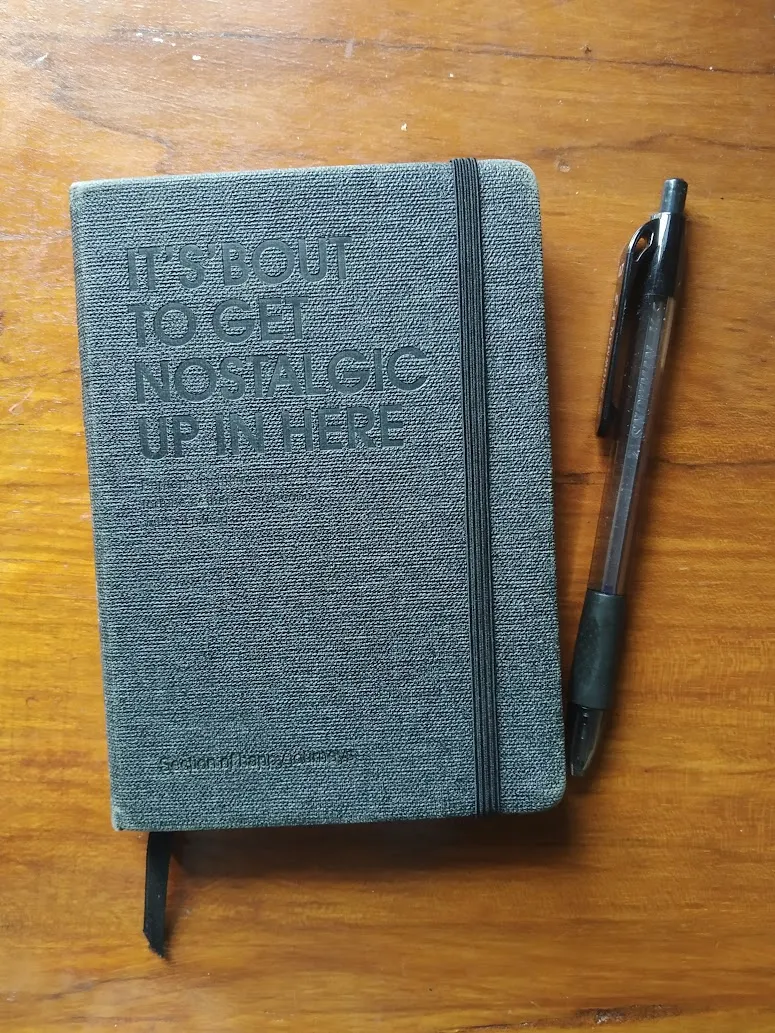My 4 Phases in Journalling
First things first, allow me to “explain” my love for this writing practice and how it bloomed.
I remember that I started to journal when I got bored over routines in school. My first entry in 2013 was when I whined about not experiencing any challenge after I was blessed with situation not everyone can have, probably by the standard of middle-school-aged teens — excel in academic performance and trusted in a (public) leadership position (yes, everyone is a leader of their own self).
Scream-of-an-Ungrateful-Soul Phase
Now that I think about it, that attitude was certainly a sign of an ungrateful soul who cannot handle such a situation. I knew at that time, there was something wrong in this self. I sensed it, so I started to write. By the help of a messy and inconsistent handwriting style, that first journalling experience put my mind a little bit at ease.
The book that I choose to write was fancy enough for me to came back at it again in a couple of days (half of the cover is the colours and shapes of a British flag —this imagery might got into my unconscious mind, engrained a fuzzy motivation to go the UK, which this village girl did in a decade after). But the habit didn’t stick as I noted down my observations and thoughts in, something like, once a month. It didn’t really take off until the apparent odds of realising what I desired started to go against me. I made some bad decisions in high school. To make things worse, I rarely reflecting the turns of events and their outcomes that much. Once I did, it almost too late such that I went into panic mode, feeling uncertainty, for the first time, haunting my future.
Praying is the very natural thing to do in such situation. At that age, I was not knowledgeable enough to understand the essence of a routine spiritual practice that I already implemented as a Muslim — the five times prayers — which is, yes, you’ve read it, prayers. I ended up expressed my prayers more in my journal than in my shalat. Probably not the perfect way to start. But it was a part of the process.
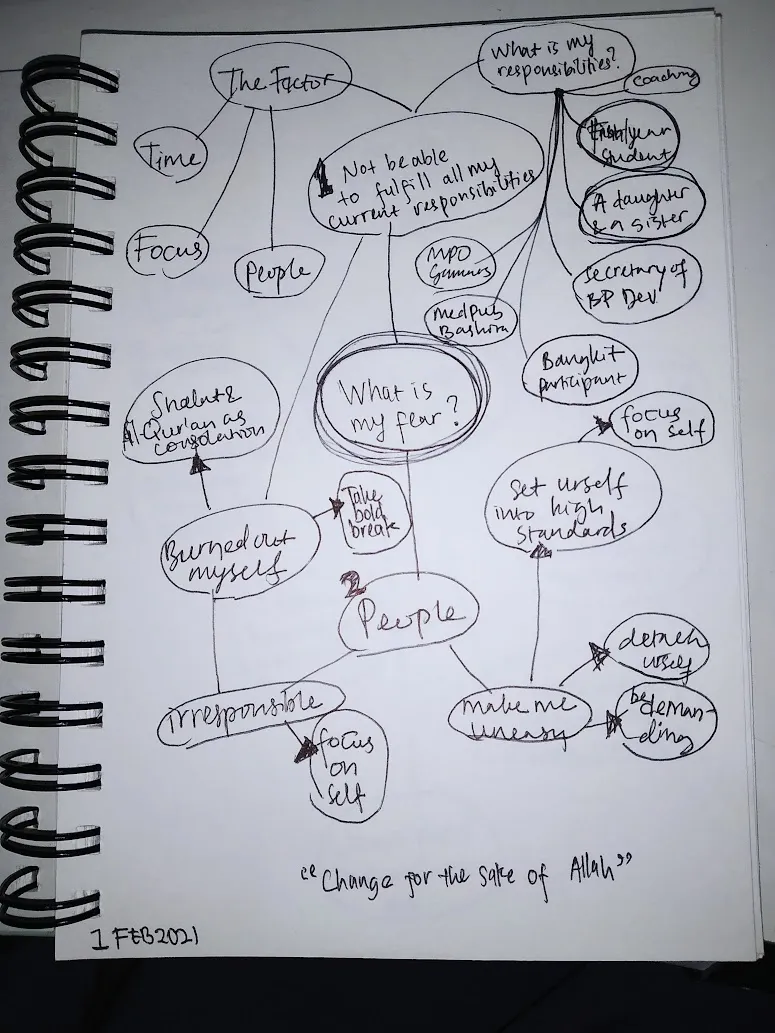 An empty paper is my safe space when things almost went downhill.
An empty paper is my safe space when things almost went downhill.
The Angstful Phase
I imagined the steps toward my main goal, that fleeting yet strong desire: accepted at one of the best higher education institution in the country. I planned my actions meticulously until the “day of judgement” arrived. I went against the trend between my peers, who were studying for national examination to get a better chance to win their dream uni through the SNMPTN programme (the “invitation” route, based on academic records), whereas I was preparing for the national-held university entrance exam, the SBMPTN (the “jungle” route, based on brain-power prowess in all-day long soul-crushing tests). To put it simply, I prepared for the hardest. All the hopes, the anguish, the strategies, the to-dos, were written down on my journal book.
Long story short, they were ended up as fruitful wishes and attempts, not in the way that I expected. I wouldn’t have to go through the hardest way that I imagined. In fact, along the way, I intentionally choose a path differ to what I initially planned. Clearer mind makes better decisions. That collection of better, small decisions guided by vision, pushes you toward the end goal, with God’s will.
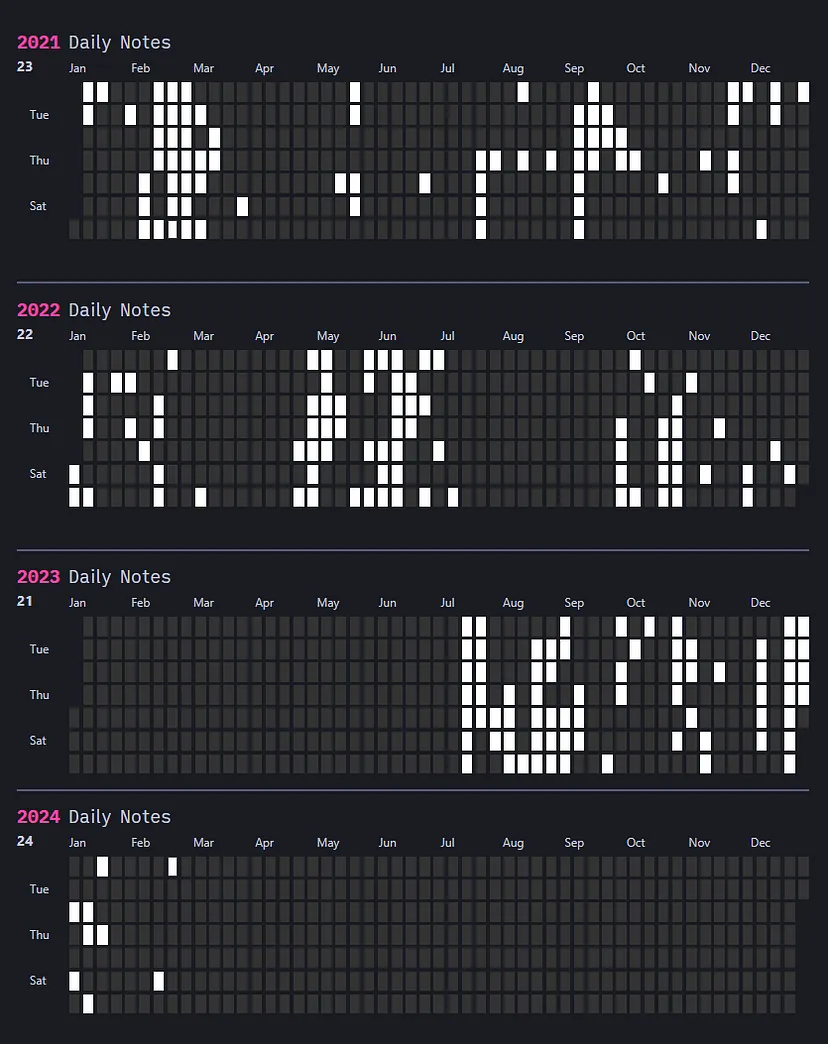 All my digital journalling attempts. Done in Obsidian.
All my digital journalling attempts. Done in Obsidian.
The Brutal Phase
The habit rolls since then. Through journalling over a decade, I discovered a less-than-flattering truth about myself. Turns out, I was mentally punishing myself too much, mistrusting of others, harboring a silent arrogance, even displaying certain narcissistic tendencies (note the hopes in that past tense!). They were hard to admit, and sometimes I sought validation of these conclusions from trusted others. Definitely, bitter pills to take, for a healthier, grounded self.
Realising the benefit of jotting down my thoughts in a brutally honest way, gradually, the prayers, both in journalling and in the praying-only moments, started to shift. They became less about asking for change and more about seeking clarity and understanding of one own needs and wants. Then other phases passed and lessons learned. My journal became both a plea for guidance and a tool for inner exploration. As this habit shaped over the years, the books became mirrors reflecting the writer’s evolving self. Each entry is a snapshot of who she was at that moment, a reminder of how far she had come, and, hopefully, a source of insight for the journey ahead.
Taking things further, I tried to take more advantage of this simple yet highly impactful practice by putting it into a sophisticated system — digital notes, over a reason to make it more accessible across devices (it’s not that digital notes are generally complex, it’s me the one who tend made it so). Once digitised, I can easily represent the journal entries as “data points.” Visualising the daily notes, easily navigating the records, and searching through the texts were some refreshing journalling experience.. until I unconsciously saw it as a chore. Using ten fingers, I typed fast, so the written down thoughts tend to be unfiltered, lacking care, only to be regreted and deleted later. Numbers and completion of records slowly become the focus. The gaps between entries were a little disheartening, as if I failed to be a consistent personal journalist. In the digital setting, I’d lost sight of journalling’s true essence, which are to slow down in this fast-paced world and becoming aware of our inner state. It didn’t go well, so I often found myself drawn back to pen and paper.
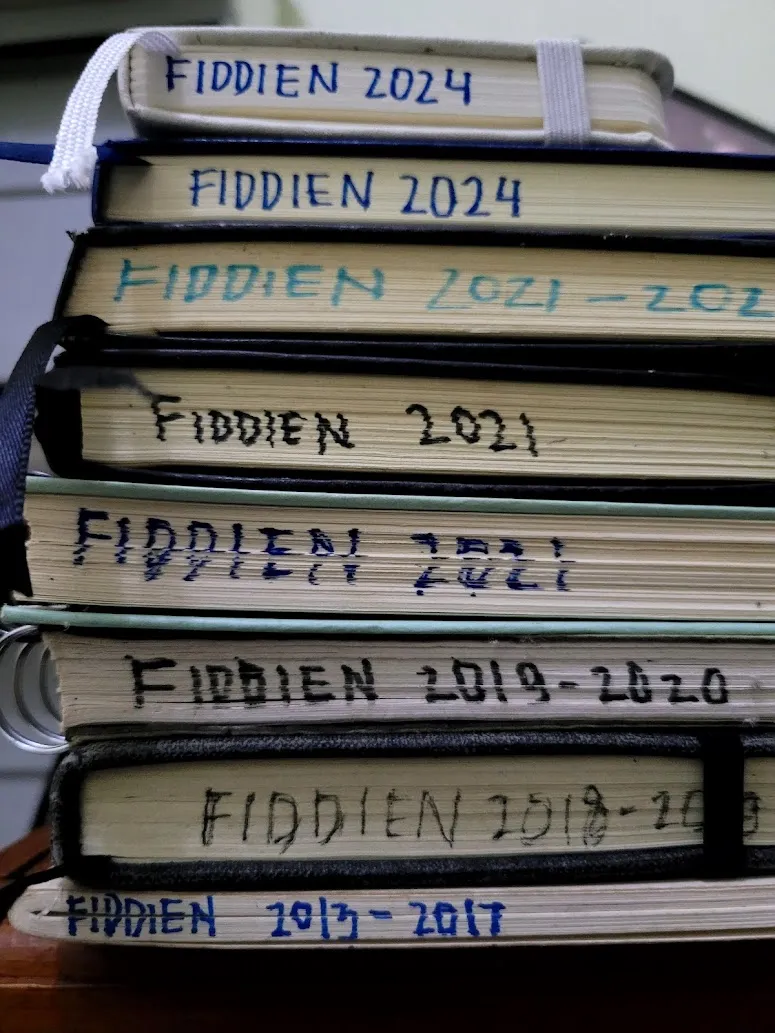 A decade documented. The 2022–2023 edition is the scariest, such that I left it behind in my flat. No, I forgot to bring it, really.
A decade documented. The 2022–2023 edition is the scariest, such that I left it behind in my flat. No, I forgot to bring it, really.
The Endgame Phase
The physicality of these handwritten journals reinforces this sense of reflection. Seeing the self-growth mirrored in the changing penmanship, the faded ink, the imperfect lines — those details make the transformations feel even more tangible. The neat vs. crooked handwriting, the size of the space between words, the tilt of the sentences — they display my emotional and mental state at the time, describing more inners than the words themselves which sometimes clouded by competing thoughts. And that’s why I prefer analog journal over the digital one. Writing those entries and revisiting them requires a slowness and intentionality that simply isn’t the same on a screen. Some might consider physical journals a burden, but for me, that’s precisely the point: to be reminded that your experience weight some, you’ve hold the burden God trusted you with, and you are still alive now, resourceful, able, well and grateful.
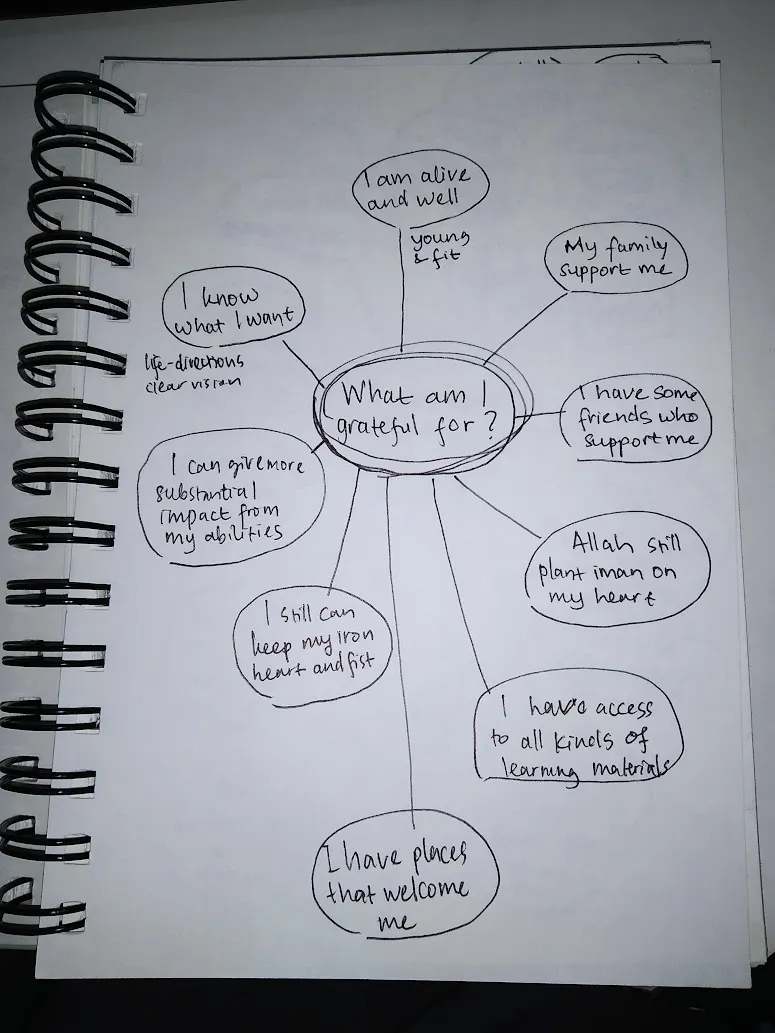 The most powerful question to face any situation.
The most powerful question to face any situation.
While journalling has provided tools for navigating life’s uncertainties and personal growth, it takes on a new dimension when used in conjunction with my faith. In Islam, we believe the life we live now is a preparation for the Hereafter. Recording my hopes, dreams, and lessons learned feels like creating a tangible roadmap toward a purposeful life and, ultimately, a good ending.
Inspired by my previous article on crafting a life strategy, I’d say we can take journalling into a more-serious level of self-reflection directing at an endgame: the examined life. The key practice is to ask tough questions that can only accept sincere answer: Am I living in alignment with my values? Are my actions contributing meaningfully to the world? Is this action of kindness performed only to be perceived nice by people or to please my Lord? Regularly journalling about these crucial inquiries keeps the ‘bigger picture’ in focus, ensuring that my day-to-day choices contribute to my broader goals.
You might start doing journalling also if you haven’t done so. While this post suggest a better change for the writer, it may not transform your life overnight, as it didn’t, in my case. For some at their early attempts, it’s a “hard” practice to spell out their thoughts with precision — a quality needed for a reflective piece — in these information-junk era of tweets, so-called stories, and infinitely-played series of short videos. These benefits I just told you about might only surface after some dedication. The question is, would you dare to start this kind of journalling while experience inconsistencies which might let you down, but then keep trying?
